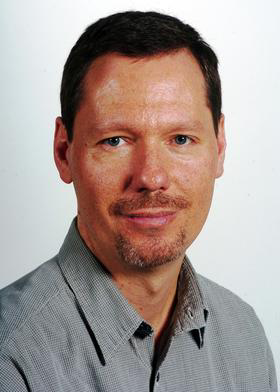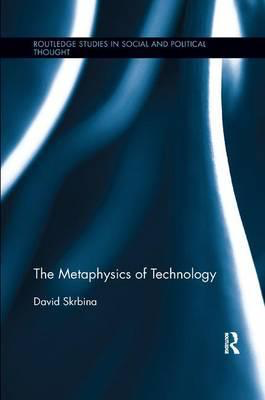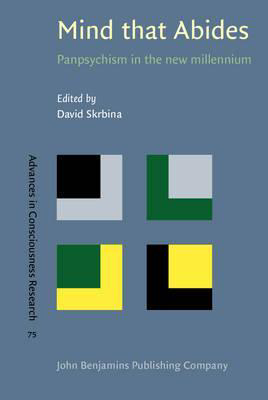Metaphysics of Technology and Panpsychism
Interview by Richard Marshall.

'Metaphysics is unavoidable, whether with respect to technology or any other aspect of philosophical inquiry. We have to make baseline assumptions about reality in order to even begin philosophical analysis, and these assumptions are metaphysical. To argue for ontological monism, dualism, or pluralism is to be metaphysical. Even to claim that nothing is metaphysical is a metaphysical claim! Metaphysics is unavoidable; the only choice is to either engage the subject, or to ignore it.'
'Nietzsche’s well-known thesis of the will to power is most often applied to the human and social realms, but in fact he intended it to be a larger, ontological theory of the nature of reality itself. He had panpsychist tendencies even from his teenage years; he once remarked that “all that is, lives.” '
David Skrbina'sareas of expertise include philosophy of mind, philosophy of technology, and environmental ethics. Here he discusses the metaphysics of technology, Heidegger, why we need a metaphysics of technology, the cognitive and epistemological conflict of interest that arises in this area, four key issues and what such a metaphysics looks like. He then discusses to panpsychism in the west, why he agrees with Galen Strawson’s claim that panpsychism obliges us to accept some version as theoretically primary, it's early origins, Italian naturalists, Spinoza and Leibniz, resistance to the mechanistic view of nature, contemporary views, and the arguments for and against it that promise a bright future for a panpsychist paradigm shift.
3:AM:What made you become a philosopher?
David Skrbina:I think I’ve always been a philosopher. From my earliest memories in school, I recall thinking about the world, God, the universe, where humans came from. I remember, as a young boy, being fascinated by ancient history, dinosaurs (no surprise there!), evolution. The idea that humans came from apes really intrigued me. In terms of religion, I was raised, loosely, as a Presbyterian, but never bought into it and stopped going to church as a pre-teen. I then began to challenge my religious schoolmates on the nature of God, what was knowable, what counted as truth, and so on.
Entering college, however, I had no thoughts of becoming a professional philosopher. I studied math, science, computers, physics, ultimately earning a Masters in applied math from the University of Michigan. But, through good luck, my interest in philosophy was sparked by some key events. As an undergraduate, I read Robert Pirsig’s book Zen and the Art of Motorcycle Maintenance, and loved it. I came across social critics, like Theodore Roszak and Ivan Illich, and was deeply impressed. Most importantly, I came to know a true philosopher, Henryk Skolimowski, and that began a long-term friendship and collaboration. His work in eco-philosophy, his critique of technology, and his theory of mind pushed me to think in entirely new ways, and eventually generated an interest in philosophy as a career. Ultimately it was through his contacts that I enrolled in graduate school at the University of Bath in the UK, earning my PhD in 2001. I started teaching in 2003, and haven’t regretted a day since.

3:AM:You’ve worked on the metaphysics of technologyand remarked that this isn’t a subject many philosophers have approached. Heidegger is a famous exception. Is his approach one that you have found useful?
DS:Yes and no. Heideggeris the most famous philosopher of technology, but his status as such suffers from some serious limitations. First, nearly all of what he has to say on technology is contained in a single, mid-size essay, “The Question Concerning Technology.” There is little further elaboration or explanation. Second, this piece, like most of Heidegger, is notoriously obscure—at times, grotesquely so. Third, nearly all of his central ideas on technology come from earlier thinkers, especially Friedrich Dessauer and Friedrich Juenger. He neglects to acknowledge their work, which is a real failing, in my opinion.
Still, what Heideggersaid was important. He was willing to deal with real metaphysical issues, with essential natures, and with the nature of being—human and technological. He raised some profound questions, even if he was unable to provide satisfactory resolution. His most important insights, in my view, are the following: (a) technology is beyond human control and functions in a deterministic fashion, (b) technology reveals something essential about the ontology of the universe, (c) ancient Greek ideas on technê and logos are highly relevant, (d) human creation is continuous with creation in nature generally, (e) technology fundamentally relates to energy and power, and (f) technology is a significant danger to humanity.
By contrast, I think we can see today where Heidegger went wrong and where his theory falls short. Among such points I would include: (1) ‘modern’ technology is not a fundamental break in the ontological order, (2) technology is not a strictly human affair; animals, at least, make extensive use of tools, (3) his essence of modern technology (“Enframing”) is too abstract and vague to serve as a useful concept, (4) the effects of technology on the environment are critical and cannot be overlooked, (5) technology has an undeniably ‘mental’ aspect to it, and thus essentially involves the concept of mind, and (6) the “saving power,” if there is one, involves more than mere artistic activity, and more than simply “watching over” technology, as Heidegger suggests. In hindsight, I think we can make progress in all these areas. I attempted to do just this, in my recent book The Metaphysics of Technology.
3:AM:Some philosophers will doubt whether a metaphysical theory is required in this area – hence the dearth of work in that area. Why are they wrong?
DS:Some philosophers, perhaps most, doubt that metaphysics is required in any area, period. But to me, metaphysics is unavoidable, whether with respect to technology or any other aspect of philosophical inquiry. We have to make baseline assumptions about reality in order to even begin philosophical analysis, and these assumptions are metaphysical. To argue for ontological monism, dualism, or pluralism is to be metaphysical. Even to claim that nothing is metaphysical is a metaphysical claim! Metaphysics is unavoidable; the only choice is to either engage the subject, or to ignore it.
With technology in particular, there is such a motive force behind it, such an air of inevitability, and such a deep connection to humanity, the human mind, and even human evolution, that we can scarcely avoid discussing metaphysics. But when we do, it quickly leads us into problematic areas—that technology is out of control, that it is dangerous, that it is something beyond the human. Most philosophers, being explicitly or implicitly technophilic, simply don’t want to raise these troublesome issues, and so they attempt to sweep the whole thing under the carpet by saying that there is no metaphysics of technology. But, as I argued above, there’s a metaphysics of everything. Hence there is an essential nature of the technological phenomenon, and we ignore it at our peril. It is, I would say, the most pressing philosophical task of the present day.
3:AM:You say there’s a cognitive and epistemological conflict of interest when approaching this subject. Can you explain what you mean by that?
DS:Present-day philosophy is largely analytic. It treats all philosophical subject matter, in a sense, scientifically: it adopts an objective stance, it constructs logical arguments, it sees reality as comprised strictly of matter and energy, it evaluates hypotheses, it disparages or ignores metaphysics, and so on. This is so obvious and natural to most people that we don’t even question it. If the question is even raised, we are tempted to reply, How else should one address things?
In some realms of philosophy, this approach is useful. But when we try to apply this ‘scientific’ analytical method to science itself, for example, or to the mind, or to technology, things start to unravel. It becomes question begging and self-serving. Science ends up confirming itself—of course. Science declares itself the virtual definition of rational thought—of course. The mind and consciousness, not being obviously matter or energy in themselves, all but vanish from existence; this is the stance of the so-called eliminativists, who really do nothing more than carry the logic of physicalist analysis to its extreme limit.
Something similar happens when analytic philosophy addresses technology. Technology suddenly becomes nothing more than specific tools, in themselves neutral things, with no underlying essence and no underlying imperatives. There is no capital-T Technology, only small-t technologies. Technology is not a bad thing, on this view; it’s all in how it’s used by human beings. Technology becomes strictly a manmade and human-controlled entity, despite evidence to the contrary. It works toward our betterment, and any problems that arise are strictly due to unfortunate side-effects or failures in human judgment. Or so we are told.
The bottom line is that a scientific, ‘technological’ analysis of technology is intrinsically biased toward a neutralist standpoint. It will necessarily overlook any technological essence, and it will necessarily overlook any intrinsic dangers. This is the philosophical conflict of interest. And it monopolizes philosophical thinking on the subject today—to the detriment of us all.
As proof of this, I need only point out that there are virtually no philosophical critics of technology today—not one. The critics, such as they are, are either non-philosophers—and thus fail to grasp the deeper philosophical issues at hand—or, if they are philosophers, they adopt such a mild, lukewarm criticism as to be almost worthless. One need only review the so-called criticisms of the likes of Borgmann, Feenberg, Ihde, Verbeek, etc. In the meantime, technology runs roughshod over humanity and the planet.
[Image:Basquiat]
3:AM:What are for you the key issues of a metaphysical theory that are particularly salient for an examination of technology?
DS:I’ve argued for what I call a synthetic metaphysical approach to technology. At a minimum, this involves an examination of (a) what technology is, in its essence, (b) what it does and how it acts in the world, and (c) how we should respond to it. This is more holistic, integrative, and normative than the usual analytic approach. These issues are all the more pressing, given looming problems like super-intelligent AI, autonomous robots, killer drones, and emergent nanotechnology.
Such analysis would deal with a number of urgent questions: Is technology truly autonomous? If not now, will it be in the near future? And should we work to prevent such an event? In general, how can we deal the problems of advanced technology without developing yet more advanced technology? If technology allegedly exists for our benefit, why is the human condition not getting rapidly better, especially given the exponentially-growing power of technology? Is technological regression still possible? Can we envision a stable, steady-state technological existence? How much technology do we really need, in order to live a good life? Such questions are rarely asked, as far as I can tell.
3:AM:So can you sketch what your metaphysics of technology looks like?
DS:I view technology from the standpoint of its etymological origins, technê and logos. I take logos much as the ancient Greeks did, as a kind of intelligent ordering principle of the cosmos. Technê involves a kind of creation or formation of something, not necessarily ex nihilo, but even merely as a rearranging or ordering of existing elements into a new configuration. The Greeks saw a cosmic Logos at work in the universe, imparting an intelligent order to things. I basically agree with this, although I would cast it in terms of more contemporary ideas about energy, structure, order, and complexity.
There’s an interesting physics behind this. As the universe expands, a thermal gradient grows between matter and radiant energy. This gradient functions like a giant heat engine, one that drives the growth of complexity. In a nutshell, anywhere abundant energy exists in the universe, matter and energy will organize into dissipative structures that take advantage of this condition. Thus we see the growth of order and complexity throughout the evolution of the universe: photons to atoms to stars to heavy elements, which lead to planets, complex molecules, and life. All levels embody a kind of intelligence or Logos. And all coming-to-be is via a process of technê. There is a technê of all things, and there is a logos of all things. Thus the universe as a whole is naturalistically teleological; it strives for order.
Manmade technology is merely the latest link in a very long cosmic chain. There is abundant energy here on Earth, and we employ this energy in the form of ever-more complex tools that themselves use and manipulate energy. We are involved with the process, but we don’t control it in any ultimate sense. We literally cannot help ourselves. We “must” advance technology, because it is an evolutionary process that is written into the very structure of our being.
Unfortunately, as evolution builds higher layers of complexity through us, we get swamped. Our technological advances progressively bury us. Increasingly, we exist for the sake of technology, not the other way around, and a myriad of ills result. That this is hazardous to our wellbeing scarcely needs mention.
In spite of this situation, I think we still have options. We can willingly oppose this evolutionary power, at least for awhile. We can deconstruct the complex technological edifice we have built, and thus buy ourselves some time—perhaps decades, perhaps centuries, perhaps millennia. I call this “creative reconstruction,” and I argue that it is our best hope for long term survival. Of course, it would involve a much simpler, de-technified social order, one likely without electricity or any use of fossil fuels. And it would necessitate many fewer people on the planet. These are some of the clear implications of my ‘pantechnical’ metaphysics of technology.

3:AM:Panpsychismis another area of interest for you. Can you first sketch for us how you understand the claims of panpsychism and what makes it unique as an approach to theories of mind?
DS:Panpsychism is the view, roughly speaking, that everything (‘pan’) has a mind or mental qualities (‘psyche’). Of course, this is a vague definition, since it’s unclear what is meant by ‘all’ and ‘mind’. Most panpsychists would say that panpsychism refers to all concrete particular objects, from the smallest sub-atomic particles up to, say, the stars. The status of collections of objects or aggregates is disputed; a molecule as an aggregate of atoms, or a solar system as a collection of stars and planets, may or may not be considered enminded. For my part, I opt for a strong form of panpsychism: all objects, and all collections of objects, are enminded or experiential.
Panpsychism is unique for at least two reasons. First, it is highly controversial, to say the least. (Or “crazy,” to say the most.) For those of us raised in a modern, scientific, technological society, it seems bizarre and counterintuitive. Even professional philosophers feel this way. Needless to say, panpsychism is a very minority—although growing—view among philosophers. Second, it’s not, as some would say, a theory of mind. Rather, it’s what I call a metatheory; it’s a theory about what kinds of things have mind. Almost any conventional theory of mind has a panpsychist extension.
3:AM:Do you agree with Galen Strawson’s claim that panpsychism obliges us to accept some version as theoretically primary over all rivals?
DS:Absolutely. Virtually all present-day philosophers of mind are non-panpsychists; they believe that only humans and perhaps certain “higher animals” have minds. This seems like common sense until we examine the implications. The immediate and major consequence of this is emergentism: that the mind, at some point in evolutionary history, arose from a world in which there was no mind at all. That is, that mind came from non-mind. This is called radical or brute emergence. For Strawson and myself, this seems like magic. How is it conceivable that some prehistoric life-form utterly without mind suddenly, at some unknown point in history, gave rise to mind, or awareness, or consciousness?
I call this the problem of historical emergence. Just consider how bizarre an idea this is: That at some point in ancient history, say, 100 million years ago, some animal species existed that had, not a small degree of mind or a slight aspect of experientiality or subjectivity, but absolutely no mental qualities whatsoever. Then one day, two utterly non-minded parents gave birth to a baby that, for the first time ever, actually experienced the world—that is, that had a mind. This is crazy! It’s a miracle, in fact, and most of us don’t believe in miracles. Far more likely, and more logical, is that the mind evolved in complexity and sophistication over time. But this entails that mind always existed, if even in highly diminished form, in all living things, at least.
Furthermore, the transition from non-life to life is relatively gradual, given the ambiguous status of things like DNA molecules, viruses, and prions. It’s equally miraculous and absurd to assume that mind sprang into existence when the first crude cellular organism evolved, or upon the first act of self-replication. Carrying this logic backward, I claim that mind likely existed in all physical structures, all the way back to the first physical ultimates. If so, it resides there to this day, even if at a very low level.
There are at least two other aspects to the emergentism problem, apart from the historical. Second is what I call the phylogenic problem: Which organisms on Earth today have minds, and which don’t? To say that only “the higher animals” have minds is impossibly vague and virtually meaningless. Philosophers never tell us what they mean by it. To do so, they would have to distinguish ‘higher’ from ‘lower’ animals on the basis of some objective physiological facts, and this they cannot do.
Third, there is the problem of ontogenic emergence: As a fertilized egg develops into a fully-formed human fetus, at what point in that 9-month process does it acquire a mind? And why just there? Does the light bulb flash ‘on’ at, say, 85,421 cells? Of course not. Any answer the emergentist tries to give would be ridiculous. The logical implication is that the light was always on, and that it grew in ‘brightness’ over time. Furthermore, it was ‘on’ in the sperm cell and unfertilized egg individually. And in every cell in the body. And in the components of those cells. And so on.
Collectively speaking, the mainstream emergentist view has hopelessly unresolvable problems. Furthermore, as Strawson says, why do philosophers think that non-mental or non-experiential matter exists at all? Where did they get that idea? They have no evidence for such a view, and no rational reason to believe it. It just seems to be ‘common sense,’ but that of course is no reason at all to believe something. Who would adopt a view—emergentism—for which there is no evidence, and which comes along with a host of irresolvable problems, including the belief in miracles? No truly rational philosopher would do so. Therefore, says Strawson, we should adopt panpsychism as the default view of mind. In this sense it has “theoretical primacy” over all non-panpsychist (emergentist) theories.
We should therefore assume, at the outset, a panpsychist ontology, until proven otherwise. But the final kicker, adds Strawson, is that there are good theoretical reasons for believing that no such evidence is even possible. By its very nature, panpsychism cannot be disproven. Since there are strong a priori reasons to adopt it, and likely no conceivable way to undermine it, panpsychism assumes an insurmountable position in metaphysics. This is a very strong argument.
3:AM:It’s not a new theory is it? In fact, you say it was the dominant assumption in some periods of history. Can you say something about the early origins of panpsychism in Western philosophy?
DS:Panpsychism has a long and noble history in Western philosophy, going back to the very beginning. The first philosopher, Thales (circa 600 BC) was a panpsychist; he said that “all things are full of gods.” In fact, nearly all of the pre-Socratic philosophers were panpsychists: Pythagoras (“soul is extended throughout all the nature of things”), Parmenides (“it is the same thing to think and to be”), Heraclitus (“all things are full of souls and divine spirits”), Anaxagoras (“just as in animals, so in nature, mind is present”), and Empedocles (“all things have wisdom and a portion of thought”)—to give a few examples.
We’re not sure what Socrates thought about the topic, but it seems clear that both Plato and Aristotle were panpsychists. Plato explicitly ascribed mind (psyche) to a surprisingly wide variety of things: animals, bones, plants, the elements, the Earth, the sun, stars, the cosmos as a whole, and even “the Form of Being.” Nothing in his admittedly vague theory of consciousness excludes specific objects, and in his late work Laws he refers directly and sympathetically to Thales’ pronouncement that ‘everything is full of gods.’ For his part, Aristotle wrote of a “sort of life” that adhered in all things, and late in life, he developed a theory of the pneuma (spirit or air) as a kind of carrier or medium of psyche. Pneuma was, for him, “the principle of psyche” and “a vital heat” that was apparently omnipresent. Vital heat is everywhere, he wrote, and therefore, “in a sense, all things are full of soul.”
Into the Hellenistic period, Epicurus was a panpsychist who believed that atoms had a kind of free will that allowed them to “swerve” (parenklisis) of their own volition. And the Stoic philosophers held a fairly uniform belief in the pneuma as an all-pervasive life force. This pneuma was, furthermore, seen as a “creative fire” (pyr technikon) that structured and organized the cosmos.
3:AM:Italian naturalists seem like the heroes of the idea in the Renaissance. Can you say something about how the likes of Cardano, Telesio, Patrizi, Campanella, and Bruno took the idea away from religion and into a more scientific world view?
DS:These ‘naturalist’ philosophers broke from dogmatic theology and began to see the world in a more modern, scientific light. They looked to nature rather than religion, sought empirical evidence, and formulated non-theological explanations. The mind, then, was seen to reside naturally and extensively in the physical realm. Cardano viewed the cosmos as a grand hierarchy, a nested system of ‘parts within wholes,’ in which soul (anima) lay at the center. Telesio developed a theory of heat and cold as primary forces in nature, with each seeking or striving, intentionally, to sustain itself. This imparted a kind of mentality to all things. Patrizi, like Cardano, placed the soul at the center of his cosmic hierarchy, and thus saw it as intrinsic to all things; it was he who coined the term ‘panpsychism’ in 1591.
Bruno adopted and modified Aristotle’s theory of forms, interpreting them as something soul-like. Since all things had a form (pattern or structure), all things were ensouled. “There is nothing that does not possess a soul and that has no vital principle,” he wrote in one of his dialogues. Finally, Campanella held that all things had a kind of self-knowledge or wisdom; they could “sense” themselves, and thus act in their own self-interest. All the “parts and particles” of the universe, he wrote, are “endowed with sense perception, some more clearly, some more obscurely”.

3:AM:Are Spinoza and Leibniz panpsychists?
DS:Unquestionably. Spinoza was a radical monist, and a pantheist at that. The one substance—“God, or nature”—embodied all conceivable attributes, and in particular the two that are known to us, thought and extension. Because every specific object was a small piece of the one substance God/Nature, each object represented or manifested each attribute as well. The specific manifestation of ‘thought’ is a mind, and therefore, according to Spinoza, each thing possessed a mind. As he famously wrote in Ethics (part II, prop 13 scholium), “all [things], though in different degrees, are nevertheless animate.”
Leibniz’s panpsychism centers on the concept of the monad—the atom-like entity that composed all material things. Each monad has a number of specific qualities, ones which are in surprising agreement with modern atomic theory—except that they are ensouled. For Leibniz, the monad’s soul consists of two aspects: appetition or desire, and perception. He described the monad as “a real and animated point,” and more broadly stated that “we must conceive of [monads] on the model of the notion we have of souls.” Evidently, in some ill-defined way, the monadic souls came to be dominated by a single master monad, which became “the” soul or mind of the thing in question. Thus, even though we have countless monadic souls in our body, our singular mind reflects the authority of the dominant monad.
3:AM:How did panpsychism fare as the mechanistic naturalist worldview grew throughout the eighteenth and nineteenth centuries? You say that there were philosophers who resisted this mechanical view of nature – even the naturalist Nietzscheis part of the nineteenth century resistance, alongside Schopenhauer, Fechner, Lotze, Hartmann, Mach and Haeckel – so how did they counter the dominant scientific approach of the time? And is it significant that they were mainly Germans or does that just reflect the fact that Germany was the centre of the philosophical world at the time?
DS:The mid-1700s to 1900 was the golden age of German philosophy, and not only with respect to panpsychism. (And with apologies to Leibniz, who died a few decades hence.) For example, Johann Herder unified all known forces under his concept of Kraft, which, for him, was a living and ensouled entity. “All active forces of Nature,” he wrote, “are, each in their own way, alive.” By contrast, Kant and Hegel each touched on panpsychism indirectly, but neither endorsed it.
Schopenhauer saw truth in Berkeley’s system of idealism—that each thing is a collection of sensory impressions or ‘ideas’—but he viewed it as an incomplete or partial truth. Starting introspectively, Schopenhauer understood that he himself, in his inner nature, was essentially volition, desire, wanting, striving: in short, will. He himself was will on the ‘inside,’ and idea on the ‘outside.’ He then reasoned that all material things must be constructed on the same model: will inside, and idea outside. If all things are essentially will, then this is a form of panpsychism.
Shortly thereafter, a number of other Germans wrote on panpsychist themes. Fechner emphasized the psyche of plants, and then extended the concept to all reality. Lotze argued for the sentience of atoms, each of which experienced “modes of sensation and enjoyment.” Hartmann defended a dual-aspect monism that unified mind and matter, which resulted in “vivifying matter.” Mach’s “analysis of sensation” led him to a panpsychic epiphany that found analogies of human will and desire in the processes of nature. Haeckel took up the newly-articulated theory of evolution and applied it to matter writ large; this led to an ontological continuity between the living and the nonliving, with the implication that “all matter is ensouled.”
Nietzsche’s well-known thesis of the will to power is most often applied to the human and social realms, but in fact he intended it to be a larger, ontological theory of the nature of reality itself. He had panpsychist tendencies even from his teenage years; he once remarked that “all that is, lives.” By his late 20s he was observing in his notebooks that “[matter] has feelings and it strives for its individual being.” His initial articulation of the will-to-power thesis in Thus Spoke Zarathustraapplied only to living beings, but by the following year he was noting that “the will to power…must also be present in the appropriated inorganic matter.”
Then beginning in 1885 we find a whole series of reflections that confirm Nietzsche’s panpsychist ontological version of will to power: “it is the will to power that guides the inorganic world as well”; “there is absolutely no other kind of causality than that of will upon will”; “the world is the will to power—and nothing more!” Beyond Good and Evil(1886) contains the striking section 36, in which he writes assertively about “the right to define all efficient force unequivocally as will to power.” In On the Genealogy of Morals(1887) Nietzsche casts positive light on “the theory of a will to power manifesting itself in all things and events.” And among his many late notebook entries of 1888, we find such passages as: “the innermost essence of being is will to power.” Collectively, such writings give a fascinating perspective on Nietzsche’s anti-mechanistic thinking.
All these views attacked the dominant metaphysical view known as mechanistic materialism: that all matter is essentially lifeless, non-experiential, and psychically inert. This view holds to the present day, although, as noted above, there is precisely zero evidence for it. If we look at the world simply in light of the evolutionary continuity of all things, as many German philosophers did, we are strongly inclined toward some form of panpsychism.
3:AM:Where are we now with the idea? What happened in the twentieth and early twenty-first century to give the approach new legs?
DS:From the early 1900s, mechanistic materialism joined forces with analytic philosophy to sideline and denigrate nearly all metaphysical theories, panpsychism among them. Despite occasional exceptions (Whitehead, Russell, Hartshorne), mainstream philosophers utterly disavowed the view, and they did so for many decades. Then beginning in the 1970s, a few renegades—Feigl, Bateson, Nagel, Globus—began to take the idea seriously again. Problems of a purely mechanistic physicalism would not go away, and the implausibility of brute emergence of mind again came to the fore. Process philosophers like Hartshorne and Griffin continued to press variations of Whiteheadian panpsychism. And ecological philosophers began to see evidence for mind in nature. From the mid-1990s, Chalmers wrote sympathetically of panpsychism, sparking broader interest. My own exhaustive study, Panpsychism in the West, came out in 2005 (revised edition 2017). And in 2006, Strawson published his initial, forceful defense of the view. At present, several philosophers are pursuing panpsychist variations of so-called Russellian monism.
In sum, the idea is experiencing a profound reawakening. Mechanistic materialism simply cannot account for the mind: qualia, consciousness, origins of the mind, subjectivity—these all remain intractable mysteries. Panpsychism offers new solutions and new ways of resolving old dilemmas, and philosophers are beginning once again to realize this fact.
3:AM:Summarising the meta-theory then, what do you think are the most powerful arguments supporting it, and what are the most difficult challenges it faces?
DS:In my book Panpsychism in the West, I examine 12 distinct arguments in favor of panpsychism. Of these, the strongest, in my opinion, are: (a) Non-emergence: we have no conception of how mind could emerge from non-mind, and thus it was likely there all along; (b) Continuity: it’s very difficult to draw a line between the minded and the unminded, particularly when evolution argues for ontological continuity among all things; (c) Dynamic sensitivity: certain ideas in chaos theory and dynamical systems strongly suggest that mental unities are omnipresent; (d) Last man standing: the failure of mechanistic materialism to account for the mind suggests that it cannot be correct, with panpsychism being the dominant alternative; and (e) Theoretical primacy: as expressed by Galen Strawson, and explained above.
Regarding challenges, I discuss seven counterarguments in my book. These range from a defense of brute emergence, to the claim that there are no relevant mental analogies between humans and nature, to the assertion that panpsychism is not ‘testable’ and hence non-scientific, to the idea that panpsychism is simply philosophically irrelevant. But the most important objection is surely the combination problem: If, say, the atoms in our body are enminded or aware, how do they compose or give rise to our singular, higher-order mind? It’s a valid concern, but not, I think, an insurmountable problem. There are a number of concepts from, for example, dynamical systems theory and field theory that could resolve this question for us. The combination problem is, as I like to say, more a call for details than an existential threat. To explain how lower-order minds combine into higher-order ones is certainly a more manageable problem than explaining how mentality arose from a physical milieu that was utterly devoid of mind.
The debate over panpsychism has all the hallmarks of what Kuhn called a paradigm shift. It’s a basic disagreement between competing worldviews, and in such cases it’s very hard for the one side to convince the other. Efforts thus shift to convincing those who are either neutral on the subject, or are new to philosophy. Eventually, over time, one side (literally!) dies off and the other assumes a position of prominence. It will be interesting to follow the trajectory of panpsychism over the coming years. I think it has a bright future.
3:AM:And finally, are there five books you can recommend to the readers here at 3:AM that will take us further into your philosophical world?
DS:A good but difficult question. Nuggets of philosophical wisdom are widely dispersed, even within the same thinker, and so it’s very hard to limit things to just five books. One is inclined to view such lists as “the best” or “the most important” books, but that’s far from the case. There is no universal measure of such things, and the value or importance of individual books are in part a function of the specific reader.
But since my hand is being forced, I would mention these works (in chronological order):

Republic, by Plato (surely the classic work of ancient Greek philosophy, a brilliant exposition of the nature of justice and of the ideal state).
World as Will and Idea, by Arthur Schopenhauer (probably the strongest single work defending panpsychism; a challenging, far-reaching, and incredibly-learned tract).
On the Genealogy of Morals, by Friedrich Nietzsche (penetrating, hard-hitting, unapologetic examination of origins of the dominant Western morality).
Zen and the Art of Motorcycle Maintenance, by Robert Pirsig (from 1974, this book got me started thinking seriously about philosophy).
The Participatory Mind, by Henryk Skolimowski (published in 1994, this is a little-known but striking articulation of mind in light of recent developments in physics and eco-philosophy).

ABOUT THE INTERVIEWER
Richard Marshallis still biding his time.
Buy his new book hereor his first book hereto keep him biding!